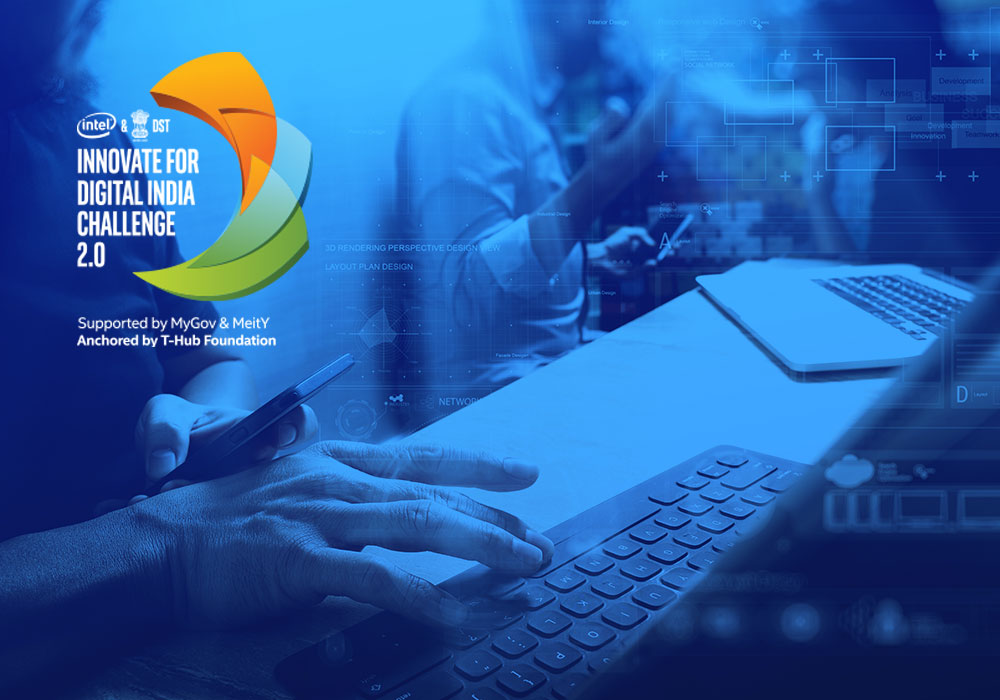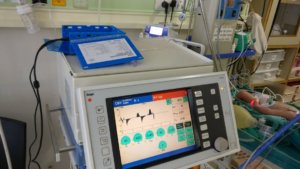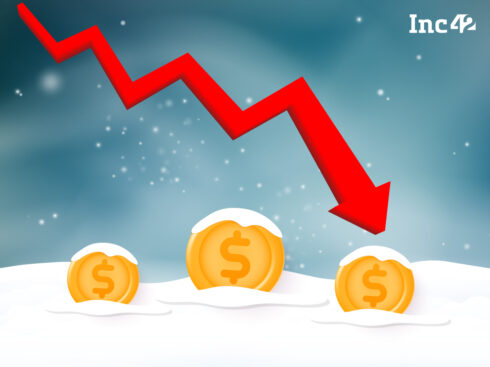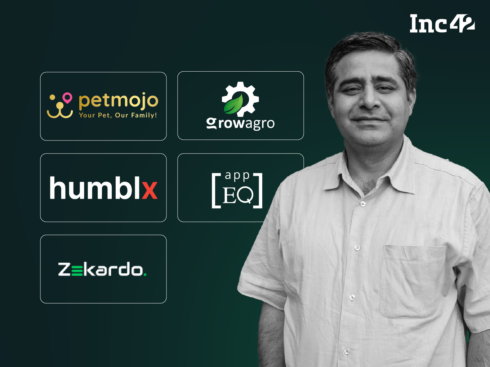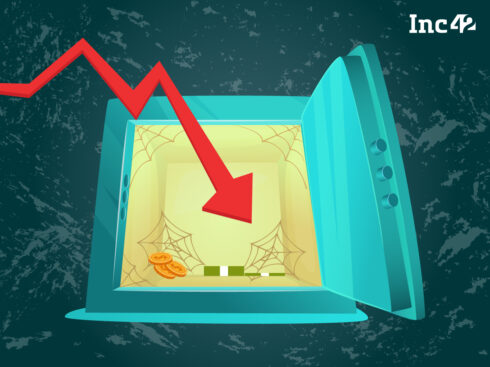Every day, we are awash with news of the latest technologies, product launches, and strategic moves of Internet giants. In this fast-paced scenario, it’s easy to lose sight of the important role technology can play in improving the lives of people around the world. With this intention, IFDI Challenge 2.0 (Intel & DST Innovate for Digital India Challenge 2.0) set out to find those top three startups that are working in their own ways to solve India’s indigenous problems.
Imagine a technology that integrates real-time clinical data from connected devices within the laboratory with bedside observational data. Or a startup that integrates the supply chain of India’s waste management and plastic recycling sector. A solution that is creating milestones in India’s preventive healthcare space. These are the pioneering technologies recognised for this year’s IFDI Challenge.
Intel India collaborated with T-Hub, DST, MyGov, and the Ministry of Electronics and Information Technology (MeITY) and launched the Challenge 2.0, inviting startups to build solutions that accelerate India’s digitisation, and to commercially develop their prototypes on Intel® Architecture.
IFDI Challenge 2.0
The challenge is designed to find and support simple but intelligent tech solutions with the capacity to sustainably improve the lives of people in the remotest parts of India. The top three winners announced today: iNICU, Banyan Nation, and AllizHealth were awarded funding support to further their efforts.
Initially, 20 startups were selected from 800 applicants. They were then further shortlisted to 10, where the startups received mentoring and hardware support from Intel over a three-month period. The selected startups belonged to a range of domains from agriculture and healthcare to renewable resources.
The three winning startups received awards for focussing their considerable talents on solving the basic problems of people in a developing country like India. As the winners of the competition, they will receive hardware support from Intel Architecture, Seed funding worth $7.4K (INR 5 lakh) each, and engineering expertise to develop and scale their solutions to India’s pressing needs.
The winners will also receive go-to-market support and access opportunities led by Intel, DST, and T-Hub and their knowledge network of partners and industry. In addition, they will have the opportunity to travel to the US for a bootcamp and a go-to-market mentoring programme with US Market Access Center (USMAC).
The top 3 winners were evaluated by a panel of industry experts including Sachin Kelkar, Head, Scale Program, Asia Pacific, Intel Software and Services Group; Sathya Prasad, Director, Ideas-2-Reality; Sashi Reddi of SRI Capital; Chris Burry, Co-CEO, USMAC; Srinivas Modukuri, Investor; Vijay Nadiminti, COO, IDEA-Technology Business Incubator of NAARM; Neel Vora, Director of Investments, T-Fund; and Girish Shivani, co-founder, YourNest.
In an exclusive interaction with Inc42, the three startups shared their journey so far:
Saving Lives, The Data Way: iNICU
“We are in the business of saving lives”, begins Harpreet Singh, who co-founded the company with his wife Ravinder Kaur, in the terrible aftermath of losing their child.
iNICU works in the space of neonatal care and attempts to reduce neonatal infant mortality rate with a system that integrates real-time clinical data from connected devices within the laboratory with bedside observational data. It enables complex clinical decisions to be made in real-time by automatically collecting clinical data, providing critical care for preterm babies.
Says Harpreet, “I started the journey as a parent. After losing my child to sepsis in preterm birth, I spent 10 weeks as a father in NICU. And for the past 2.5 years, working in the NICU environment, I’ve realised that the real data is the baby in the NICU. Your hands are shivering and it is very hard to work on real subjects. At the same time, in India we have the highest amount of preterm babies every year, somewhere around 3.5 Mn, and have the highest mortality rate of losing 0.74 Mn babies every year. This is also compounded by the fact that India witnesses 1.4 Mn deaths every year for children upto the age of five years. Even if you save these babies in the NICU using technology and medical aid, one also needs to conduct growth surveillance to protect these babies up to five years at least.”
Attempting to solve this problem, the startup has devised a two-part solution. The first is iNICU, under which the startup attempts at reducing human error in neonatal child care using data. Adds Harpreet, “We collect data from all across India, we provide an interface for doctors and parents to monitor the health of the baby from their birth to adolescence.”
The startup is running pilot programmes in three large hospitals in Delhi-NCR and Mumbai. It also claims to have tested its product in small towns as well.
iNICU & ICHR: Big Ideas From Big Data
iNICU (integrated Neonatal Intensive Care Unit) is an integrated platform which automatically collects real-time clinical data from the connected devices, laboratory results, and bedside clinical observations, and analyses the data in user-definable formats and medically viable terms, which enhances the overall quality of healthcare provided to neonates in NICUs.
This data is extended into an integrated Child Health Record (ICHRCloud) application which is an engagement platform that works on a subscription-based model, to record and monitor the immunisation schedule, health, growth, and developmental profile of the child from birth to 18 years. The startup aims to provide a complete child healthcare solution that leverages IOT, cloud, and big data technology.
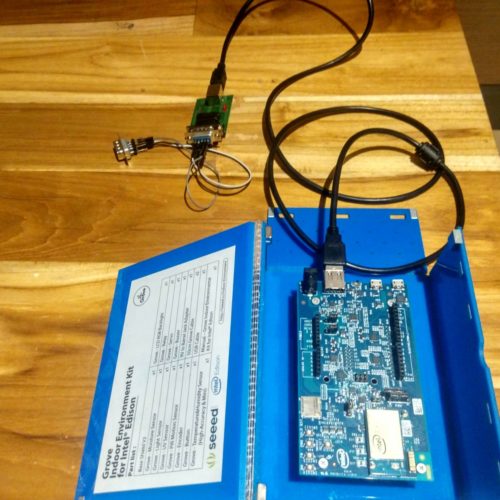
The company essentially works on a B2B model and parents who want to avail the service, pay a subscription fee to the hospital. Says Harpreet,
“Since the project started as a father’s attempt to save his child, I’ve tried to make the technology and the product as affordable as possible. We send clinically-validated data to parents’ phones via the hospital. Under iNICU, we have a per day/per bed occupancy model where the hospitals can either pay us an annual fee or pay us on per day basis.”
The startup has also received the CIIE healthcare award from the Entrepreneurial cell of IIM Ahemdabad. It has also won the IBM Smartcamp for Healthtech award in October 2016. According to Harpreet, the company is also in the process of closing its Seed round of funding.
The Future Of Neonatal Care Is Technology: iNICU
Adds Harpreet, “We currently have 27,000 babies registered on our platform in just eight months, which justifies that our reach is very high. We are currently adding 5,000 babies onto the platform every month, and in totality, we have the data of close to 70,000 children on our network. We are also working with two state governments and plan to subsidise our technology to such a level that it becomes INR 1 per baby for the government.”
When asked about future plans, he says, “The technology is the cheapest part of our product. What’s hard is skill development and training. So two things we are going to focus in the coming future – are working closely with public health initiatives by the government to increase the reach of our product and to work closely with government bodies to train the neonatal staff to get them acquainted with technology and how to use our platform.”
Towards A Clean, Digital India: Banyan Nation
Indian cities, due to rapid urbanisation, now face a very serious problem – that of waste management and compromised air quality. The adoption of technology to solve the woes of this large scale problem is the only way we can tackle this issue and ensure that India develops smart cities in the very near future.
Begins Mani Vajipey, CEO and co-founder, Banyan Nation, “The specific problem that we are trying to solve with our product is how do you manage the city waste and how do you solve the major waste management challenge at large. We have been in the space for waste management for four years now and we work with large companies enclosing the loop on plastic recycling.”
Incubated at T-Hub, Hyderabad-based Banyan Nation is an innovative technology-driven recycling venture that is using a combination of informatics and polymer science and engineering to the recycling value chain. Banyan’s smart waste technology platform allows cities to manage city waste and recycling operations through a combination of on-field sensors like biometric attendance devices, bin sensors, GPS truck routers, DRCC and landfill management toolkits and back-end visualisation and analytic engines.
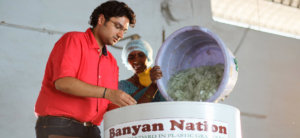
Adds Mani, “Ultimately, we wanted to reach directly to the consumers and help communities manage their waste effectively. This specific product is an end-to-end solution that helps them do just that. This is less of a problem of intent and resources, and more of a problem of understanding how waste flows, we need to understand the data around waste and once you have those patterns emerging, we can figure out a solution that needs to be adopted for each of these individual problems.”
An End-To-End Solution To City Waste
Banyan Nation uses a modular design which is customisable to suit the needs of different municipalities and third-party system integrators developing smart city solutions. The company also aims to solve the problem of carbon footprint of the cities.
Continues Mani, “We are trying to solve this problem by digitising and streamlining the cities’ waste management using data analytics. Our product, that we have developed in conjunction with Intel, is catered towards municipalities and the government. It is an IoT-based solution that will help city officials track collection efficiencies, and waste that is occupying free land in the city etc. Think of it as an end-to-end solution that contains hardware, software, an analytics engine and a decision-making engine. It aims to take cities online and create effective and efficient data around waste.”
As per Mani, cities in the state of Telangana have expressed interest in a few solutions the startup is offering to manage their cities’ waste, via its technologies. It is working with the civic authorities in Warangal, Telangana to deploy sensors in bins, GPS in trucks, and biometric attendance devices.
Waste As A Utility: The Roadmap
On being asked if it’ll like to work in conjunction with the government while developing technology further, Mani adds, “We have consciously tried to move away from the government in the plastic recycling business. We did so because we felt a pinch of government inertia. However, the truth is that the problem of waste management has to be solved at the government’s end. Waste can be a utility. One cannot escape the government, I mean I can only hide for so long. Now the government, Intel, and everybody has come together and they are seeing waste as something that can be used as well, not just disposed off.”
Going forward, the company plans to go big. It plans to develop a very low-cost solution which is at the same time very robust because all the hardware components in the technology will be vetted by Intel.
Adds Mani, “If you start envisioning the solution at a cluster level, and you deploy it in four cities situated at a distance of 100 Kms of each other at the same time; then the government will have patterns emerging around waste flows, material recovery, and resource recovery. This will, ultimately, lead to the formation of the right infrastructure and will attack the problem at its core. We are very hopeful, because what was started as a back-end project has emerged out as a full fledged solution for the cities.”
Combining Preventive Healthcare And Wearable Tech: AllIzHealth
Started as a result of personal loss and relative experience in the healthtech space, AllIzHealth is working in the space of preventive healthcare and trying to solve the problem of elderly care.
Begins Chinmoy Mishra, co-founder, AllIzHealth, “The Indian healthtech space has seen a shift from focussing on communicable to noncommunicable diseases. Based on all the data we have collected from users on our platform, we figured that there were three areas that were building pain areas for our consumers: geriatric, women’s health, and mental health. We chose geriatrics because we could reach out to a pan-Indian presence with our product, scalability, and also because my co-founder and sister, Rashmi and I, lost our grandfather to a severe fall. We realised he had fallen down after a day, and by then it was too late.”
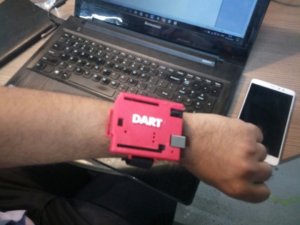
The startup offers a flagship product by the name of DAT(Detect and Alert), which is an assistive device based on the Intel® Curie module – where it connects the user with a health management platform that assesses and anticipates health risks, particularly related to geriatrics support. It also provides an integrated, predictive algorithm and the wearable device digitally connects users with various ecosystem partners/caregivers for alerts on falls and resulting support and condition management.
Seamless Integration Into User’s Life: Future Plans
Adds Chinmay, “In terms of marketing in phase I, we are trying to push the product out in the market via our partners and then taking it to their consumer base. We’ll then, based on the feedbacks we’ll receive, market the product in the B2C space. We are trying to make it as less intrusive as we can, remove dependencies on things like the Internet, WiFi, and Bluetooth. It will be a completely effortless product. We are also trying to make it location-agnostic.”
The company has also entered into strategic partnerships with various insurance companies and agencies such as ICICI Lombard, Bajaj Allianz, and Bharti Axa to market its product. It has also partnered with corporate hospital chains like Max hospitals, Manipal Group, and Medanta, and it also works with corporates such as Accenture and Kotak Mahindra among others.
When asked about competition, Mani says, “We plan to tackle competition from international players such as Philips and GE, by giving our Indian users a very affordable solution when compared to the ones these companies are offering. We offer our product at a one-time cost of INR 6K-INR 7K, which is affordable, considering Indian consumer standards. We are also enhancing our app’s communication protocols and trying to develop this technology where the wearable gets charged as soon as one is exposed to light.”
The company further plans to enhance its predictive algorithm to include cardiac arrest risk prediction and alert system and add medicine reminders for chronic diseases to its device.
All three startups in their own respective areas are working towards juxtaposing the growing digital economy with social responsibility and making the goals of sustainable development a reality in India.



